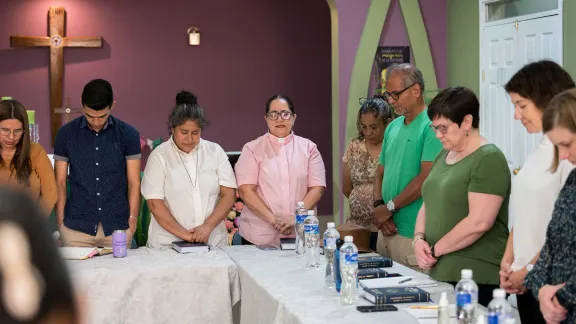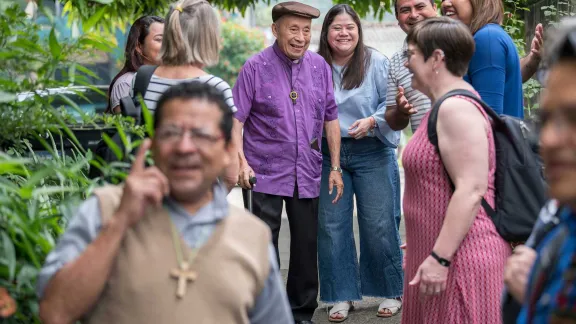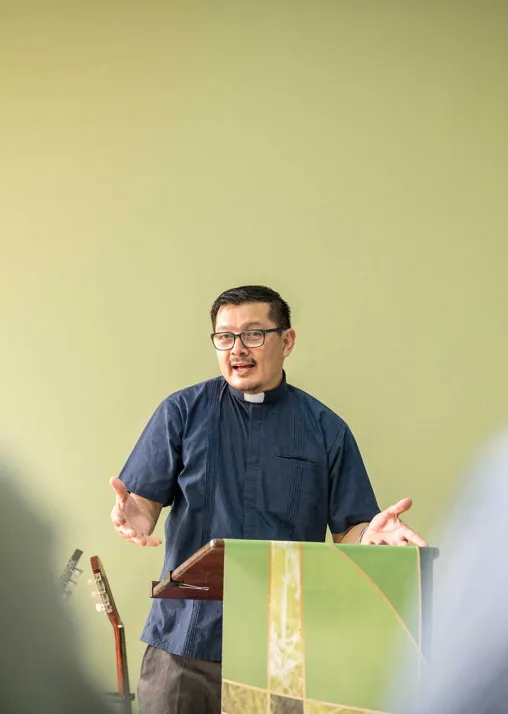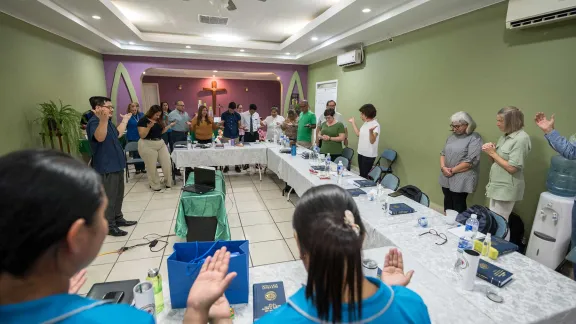LWF General Secretary Burghardt visits Central America to listen, see and learn from the witness of LWF member churches and the LWF Central America country program.

25 October 2023, Tegucigalpa, Honduras: Rev. Lidia Suyapa Ordoñez, pastor of the Camino de Emmaus Church of the Christian Lutheran Church in Honduras, leads a moment of prayer at the Resurrection Church in Comayagüela with visitors from the Lutheran World Federation under the leadership of general secretary Rev. Dr Anne Burghardt. Photo: LWF/A. Hillert
LWF General Secretary visits member churches in Central America
(LWI) - Visiting a region facing often diverse and grave social and political challenges, the Lutheran World Federation (LWF) General Secretary Rev. Dr Anne Burghardt is in Central America this week to listen, see and learn from the witness of LWF member churches and the LWF Central America country program.
The Central America region – where the LWF is present both through its member churches and a World Service programme providing humanitarian aid to people in need – is ripe with long-standing challenges, including poverty and hunger, violence, forced migration and not least the increasing threat of a changing climate. At the same time, it is a region where LWF member churches continue to carry out their witness, not least through the leadership of young people, women and men working side by side.
In El Salvador and Honduras, General Secretary Burghardt met with representatives from local churches in both countries, as well as representatives of member churches from Mexico and Nicaragua and of other related agencies and partners present in the region.
Living out the gospel in word and action
Bringing together church leaders from across the region at the Lutheran Synod of the Salvadoran Lutheran Church in San Salvador on 24 October, Bishop Medardo Gómez spoke to the importance of witnessing to the gospel not only through words, but also in action.
“We have learned that as church it is not enough to just remember, but necessary to live out our faith in deed and in action,” the bishop said, noting that the LWF World Service programme for Central America celebrates its 40th anniversary since opening in the country in 1983.

24 October 2023, San Salvador, El Salvador: Bishop Medardo Gómez of the Salvadoran Lutheran Church (centre) pictured welcoming visitors to the synod of his church in San Salvador. Photo: LWF/A. Hillert
“Through the years, we have tried to create a church that responds to the needs of the people in our country,” Medardo continued.
Local pastors from across the country brought forth the stories of initiatives led by female and male church leaders alike – seeking in different ways to address the traumas of war among individuals and communities, of gender-based violence and the impacts of climate change. Their country is living through a prolonged ‘state of exception’ declared by the Government – suspending certain constitutional rights as part of a political response to decades of high rates of gang violence.
“We support each other to carry out God’s work in the world,” said the bishop and added: “as church we must find ourselves serving the people.”
‘Going where God calls us to be’
Across the border in neighbouring Honduras, a country marked by many of the same challenges as El Salvador through the years, members of the Christian Lutheran Church of Honduras (ICLH) received the General Secretary in Comayagüela on 25 October, spotlighting the precarious situation in which many Hondurans – and more broadly many Central Americans – find themselves these days.
“We are living through very difficult times,” said ICLH president Rev. Julio Caballero, who described a society where poverty, hunger and limited opportunities for improved living conditions drive people to migrate in hope of a better future – a wish that does not always seem to come true. With taking up the dangerous journey, many people risk their lives, including young people who are leaving the country in search for better opportunities.

25 October 2023, Tegucigalpa, Honduras: Church president Rev. Julio Caballero of the Christian Lutheran Church of Honduras pictured speaking at the Resurrection Church in Comayagüela. Photo: LWF/A. Hillert
“We are a church that not only proclaims the Gospel in the rooms of comfortable temples, but also in an ordinary house, or simply under a mango or a coconut tree somewhere in our communities. We go to proclaim the Gospel wherever the Lord calls us to be,” Caballero added.
For the ICLH, the issue of serving people in need and being present among the most vulnerable communities appears to sit at the heart of living out the Gospel.

25 October 2023, Tegucigalpa, Honduras: Lutheran World Federation general secretary Rev. Dr Anne Burghardt gives the blessing as church members and visitors from the Lutheran World Federation gather for a moment of prayer at the Resurrection Church in Comayagüela. Photo: LWF/A. Hillert
“As a church here in Honduras, we serve in many neighbourhoods that are classified as high-risk areas. We face this, knowing that God guides us, protects us, and accompanies us,” Caballero said. “When our people do not have food, we try to provide something to keep them from being hungry. Through our many small projects, we try always to offer at least something to bring hope.”
“Among conflicts, poverty, hunger and despair, we ask ourselves, what can we as a church do to give hope?” he asked.
Rev. Belinda Colindres Matamoros – local pastor and gender focal point at the ICLH, and one of three coordinators of the LWF Gender Justice Network in Latin America and the Caribbean – highlighted specifically the role of gender-based violence as a dimension adding to the set of root causes for migration, particularly among young women.
And for Rev. Lidia Suyapa Ordoñez, who serves as pastor at the Camino de Emmaus Church of the ICLH, the question of how to sustain hope raises not only immediate practical concerns, but carries a clear gender-dimension. She reflected on the need for access to online courses in theology with the aim of helping to widen the perspective for pastors at the local level, but also to give them access to formal theological education.
“As women in the church, we would need to be able to access courses that offer us tools for critical theological analysis. We need this to be able to make a change, to create the just societies that we want to see for our people,” Ordoñez urged.
Reflecting on the stories of the member churches in the region, General Secretary Burghardt stressed that “the question how big a church is, does not depend on its number of members, but on its witness. When we work for bringing hope, there is not always success, but the truth is we simply do not have the liberty of giving it up. As the prophet Zechariah says, we are “prisoners of hope”, called to make God’s new creation more visible in the world. Helping people in need, giving voice to those who are otherwise not heard, is so very important,” concluded Burghardt, whose visit will continue to see the work of the LWF World Service programme in the field.


